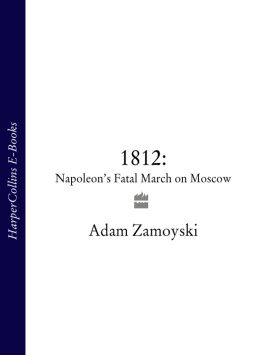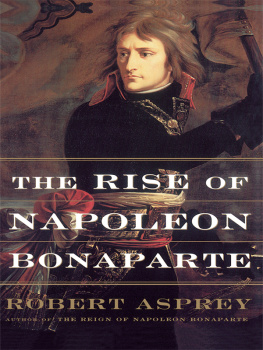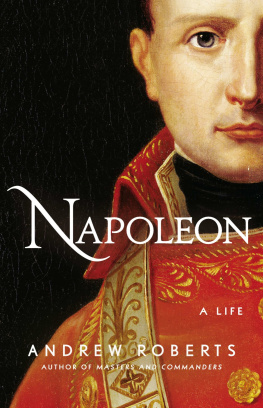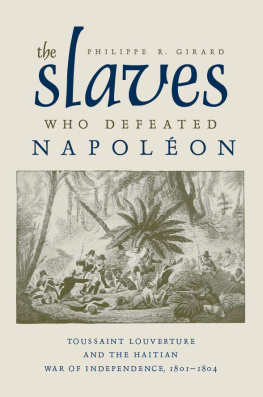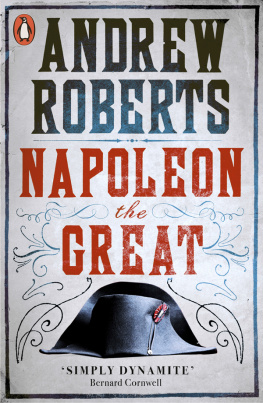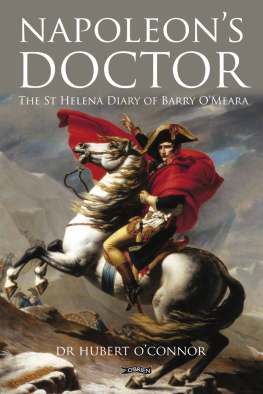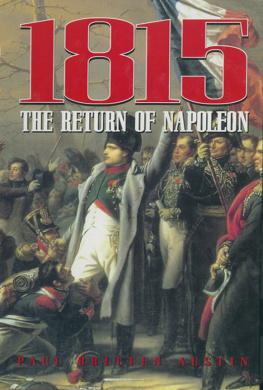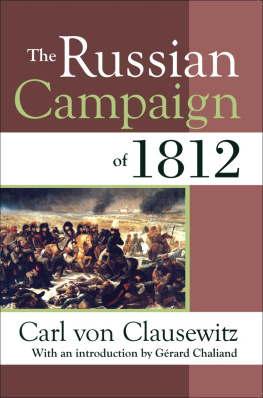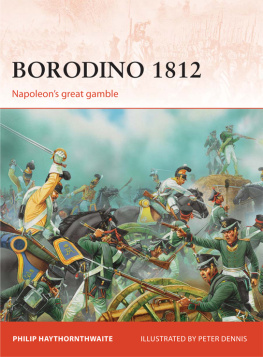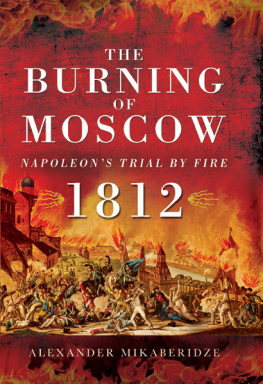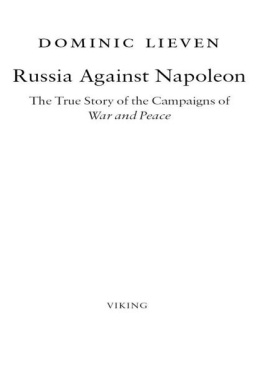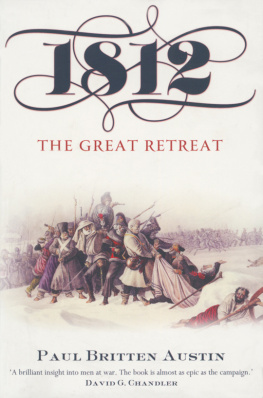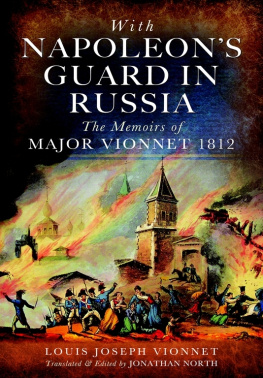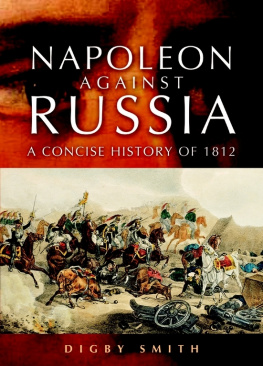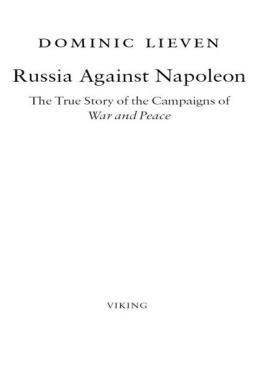
Elegantly delivers gripping storytelling, bold revisionism,
and poignant suffering
SIMON SEBAG MONTEFIORE, Evening Standard
Read this book and you will feel that you have as good as lived Napoleons march on Moscow
Daily Mail
An uncommonly vivid narrative of Bonapartes disastrous Russian campaign
MAX HASTINGS
An epic account
Observer
Zamoyski is such an economical and elegant writer
This is a great book
Sunday Times
Vividly described. No historian has dug
so deeply into eyewitness accounts
Literary Review
A gripping tale
Economist
Babinovitse: Babinowicze (Polish), present-day Babinavicy (Belarus)
Berezina: Berezyna (Polish), present-day Bjarezina (Belarus)
Beshenkoviche: Bieszenkowicze (Polish), present-day
Beankovicy (Belarus)
Bobr: Bbr (Polish), present-day Bobr (Belarus)
Borisov: Borysw (Polish), present-day Barysau (Belarus)
Brest: Brzesc (Polish), present-day Brst (Belarus)
Dnieper: Dniepr (Polish), present-day Dnjapro (Belarus)
Drissa: Dryssa (Polish), present-day Verhnjadzvinsk (Belarus)
Dubrovna: Dubrowna (Polish), present-day Dubrovno (Belarus)
Dunaburg: Dzwinsk (Polish), present-day Daugavpils (Latvia)
Glubokoie: Gebokie (Polish), present-day Glybokae (Belarus)
Grodno: Grodno (Polish), Grodna (Belarus)
Kobryn: Kobryn (Polish), present-day Kobryn (Belarus)
Kovno: Kowno (Polish), present-day Kaunas (Lithuania)
Ladi: Lady (Polish), present-day Liadi (Belarus)
Loshnitsa: osznica (Polish), present-day Lonica (Belarus)
Miedniki: Miedniki (Polish), present-day Medininkai (Lithuania)
Minsk: Minsk (Polish), present-day Minsk (Belarus)
Mogilev: Mohylw (Polish), present-day Magilev (Belarus)
Molodechno: Moodeczno (Polish), present-day Maladzecna (Belarus)
Mstislav: Mscislaw (Polish), present-day Mscislav (Belarus)
Niemen (river): Niemen (Polish), present-day Nemunas (Lithuania)
Nieshviezh: Nieswiez (Polish), present-day Njasvi (Belarus)
Orsha: Orsza (Polish), present-day Ora (Belarus)
Oshmiana: Oszmiana (Polish), present-day Amjany (Belarus)
Ostrovno: Ostrowno (Polish), present-day Astrovna (Belarus)
Pleshchenitse: Pleszczenice (Polish), present-day Plescanicy (Belarus)
Polotsk: Polock (Polish), present-day Polack (Belarus)
Ponary: Ponary (Polish), Panarai (Lithuania)
Shvienchiany: Swieciany (Polish), present-day Svencionys (Lithuania)
Smorgonie: Smorgonie (Polish), present-day Smarhon (Belarus)
Studzienka: Studzienka (Polish), present-day Studenka (Belarus)
Tolochin: Toloczyn (Polish), present-day Talacyn (Belarus)
Troki: Troki (Polish), Trakai (Lithuania)
Vesselovo: Weselowo (Polish), Veselovo (Belarus)
Vilia: Wilja (Polish), present-day Neris (Lithuania)
Vilna: Wilno (Polish), present-day Vilnius (Lithuania)
Vitebsk: Witebsk (Polish), present-day Vicebsk (Belarus)
Volkovisk: Wokowyski (Polish), present-day Vavkavysk (Belarus)
Zakrent: Zakret (Polish)
Ziembin: Ziembin (Polish), present-day Zembin (Belarus)
Napoleons invasion of Russia in 1812 was one of the most dramatic episodes in European history, an event of epic proportions, etched deeply in the popular imagination. I only had to mention the subject of this book for people to come to life, stirred by recollections of Tolstoys War and Peace, by the scale of the tragedy, by some anecdote that had lodged itself in their memory, or just a mental image of snowbound Napoleonic tragedy. But the flash of recognition was almost invariably followed by an admission of total ignorance of what had actually happened and why. The reasons for this curious discrepancy are fascinating in themselves.
No other campaign in history has been subjected to such overtly political uses. From the very beginning, studies of the subject have been driven by a compulsion to interpret and justify that admits of no objectivity, while their sheer volume over five thousand books and twice as many articles published in Russia alone in the hundred years after 1812 has helped only to cloud the issue.
This was to be expected, considering what was involved. There were great reputations at stake: those of Napoleon, of Tsar Alexander, of Field Marshal Kutuzov, to name only the obvious ones. There was also a need to make sense of the whole business, for this war, unprecedented in the history of Europe in both scale and horror, was not easy to assess in military terms. The action was often confused. Both sides claimed victory in every engagement. And if the French had lost the campaign, the Russians could hardly be said to have won it. At the same time, people on both sides had behaved with a savagery that neither nation wished to contemplate.
In France, early attempts at a balanced study were complicated by political factors: the regime which replaced Napoleons soon after the events required anything to do with him to be represented in the most negative terms. Censorship also played a part in Russian assessments, for more complex reasons. The events of 1812 and their aftermath raised questions about the very nature of the Russian state and its people, and, as the historian Orlando Figes nicely puts it, the nine-teenth-century quest for Russian nationhood began in the ranks of 1812.
This quest was innately subversive of the Tsarist system, and led in the first place to the Decembrist Rising of 1825. It was pursued, along divergent paths, by those who sought a more modern Russia integrated into the mainstream of Western civilisation, and by the slavophiles, who rejected the West and all it stood for, seeking instead a truly Russian way. The events of 1812 were used by both sides to back up their arguments, rapidly attaining mythological status and becoming increasingly distorted as a result. This dualism was only complicated with the advent of Marxism.
The first French historians to write about 1812 were either hostile to Napoleon or motivated by a desire to ingratiate themselves with the post-Napoleonic regime, and therefore laid all blame at the feet of the demon Bonaparte. But most French writers on the events of the campaign, whether they were participants or later academic historians, have followed a more measured, and broadly similar, path. While often displaying a degree of embarrassment over such an apparently imperialist venture and the misery France inflicted on the Russian people, not to mention her own and her allies soldiers, they have tried to redeem Napoleons reputation and the honour of French arms by a generous representation of the doughtiness of the Russian soldier and of the implacable nature of the Russian climate. They have also clutched at the straw of comfort held out by the Romantic imagination of the 1820s and 1830s, which turned the picture of sordid disaster into a vision of greatness in adversity.
In the last decades of the nineteenth century, distance as well as a growing cordiality between the two nations made it possible for French historians to approach the subject more objectively. The centenary, coming as it did just before the Great War and at a time when the two nations were allies, saw cooperation between the historical commissions of the French and Russian staffs, and led to the publication of much primary source-material. But French historians continue to show a certain reluctance to deal with the war, and have come up with no satisfactory general study of it.
The first Russian account of the events, by a colonel on the general staff, was produced with such alacrity that it was published, in English, as far afield as Boston within a year. It was undoubtedly a piece of propaganda, intended to pave the way for Russias future role in the affairs of Europe, but it did reflect the perceptions of large sections of Russian society. It depicted Alexander as the catalyst who rallied a gallant patriotic nobility and a loyal peasantry eager to defend Faith, Tsar and Fatherland.
Next page
